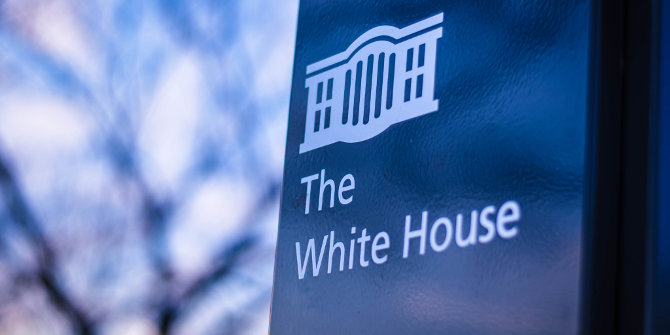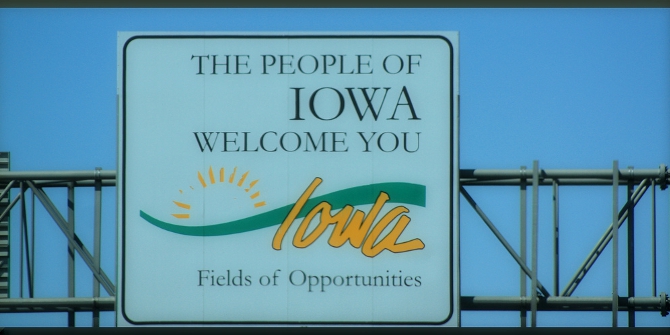 While Donald Trump leads the current Republican primary field, most commentators believe that his likelihood of ascending to the presidency next January is fairly slim. But what if Trump did win? Would he be able to govern effectively? Michael A. Livermore argues that without his party’s backing, a President Trump would have enormous problems managing the executive branch. He writes that without a large and competent group of loyal party personnel to manage the executive bureaucracy, a Trump administration would be faced with one policy disaster after another.
While Donald Trump leads the current Republican primary field, most commentators believe that his likelihood of ascending to the presidency next January is fairly slim. But what if Trump did win? Would he be able to govern effectively? Michael A. Livermore argues that without his party’s backing, a President Trump would have enormous problems managing the executive branch. He writes that without a large and competent group of loyal party personnel to manage the executive bureaucracy, a Trump administration would be faced with one policy disaster after another.
Although many have pointed out how hard it will be for Donald Trump to win the presidency, there is no denying that his polling lead has proven durable going into the voting season. With that in mind, some people are starting to think about how difficult—perhaps impossible—it would be for Trump if he ended up in the White House. A Trump hypothetical is interesting because it sheds light on how contemporary parties mediate the always fraught relationship between the President and the federal bureaucracy, if even (at least right now) they appear to be losing their grip on the primary process.
Let’s focus on this issue by putting aside the problems that a Trump-like President would have interacting with Congress. Those problems could be huge. But even more central to the job is managing the executive branch. Without a party, no President could succeed at this essential task.
When Presidents take office, they face the enormous problem of exerting control over the vast and sprawling federal bureaucracy. The federal government employs 2.7 million civilians who are divided into an array of agencies with unique histories, conflicting and overlapping missions and priorities, and distinct policy preferences and cultures. These agencies make the lion’s share of the policy decisions in government: what to regulate and how, who to enforce against, what to fund. Especially as Congress has grown less effective, agencies have stepped into the void. It is through agency oversight that Presidents are often most able to purse their policy agendas. Obama’s moves on climate and immigration are just two big recent examples.
But agencies are not easy to control. Because so much policy discretion is lodged within agencies, Presidents and their core band of loyalists cannot make every decision themselves, or even closely supervise those who do make the decisions. Even the “big” decisions made in the White House are heavily conditioned by the work done at agencies, which supply the options and the information to decide between these options. Even with clear marching orders, effective agency action requires expertly maneuvering a dizzying array of statutory and procedural roadblocks—there are innumerable ways for recalcitrant agency officials to softly thwart a policy they dislike. Further complicating matters, nearly all of the employees in these agencies enjoy civil service protection of some sort, and cannot be casually terminated, even if the President of the United States says, “You’re fired.”

As political scientist Terry Moe noted in the 1980s, Presidents use two strategies to control the executive branch: politicizing the top-tier management at agencies and centralizing decisions in the White House. To pursue either, the President needs to appoint a large group of loyal and competent personnel. These days, that means finding roughly 3,000–4,000 capable people who share your views and will not embarrass you. Choose people who aren’t competent, and you get Iran-Contra, Katrina, or worse. If you appoint people who aren’t loyal to your policy agenda, they will pursue their own goals, not yours. Choose embarrassing people and you’ll find yourself faced with endless confirmation disasters.
As my recent work argues, parties help Presidents meet this challenge. Contemporary parties are diffused networks of donors, politicians, think tankers, interest groups, campaign consultants, academics, state and local officials, congressional staff, and lobbyists. Many of the core group are professionals: lawyers, PR people, managers, economists, or policy wonks. You can think of these people as “partisan technocrats” who share a rough ideological perspective, have longstanding working relationships with each other and party constituencies, and possess deep knowledge about policy and how government works. When Presidents come to town, they draw heavily on this group to fill positions around government and exert control over the bureaucracy. After the 2016 election a Republican President will draw from one network or a Democratic President will draw from the other, and that choice between networks will be one of the most consequential effects of the general election.
A genuine outsider like Trump would face a kind of Hobson’s choice when taking office: either take what’s on offer or nothing at all. This new President could choose to govern like a conventional Democrat or Republican and draw on a party network for their nominees, essentially turning over the government to the establishment. Or they could strike out on their own, trying to personally solve the problem of loyalty and competence without party support. The first option forfeits their outsider status. The second option would almost certainly lead to disastrous results, with incompetents running important government programs leading to a hodgepodge of incoherent policy decisions. Perhaps the best that could be hoped for in that situation is that career bureaucrats would operate largely free from effective White House oversight, with the government essentially running on autopilot.
It would take years, perhaps decades, for an outsider to establish the network needed to effectively control the executive branch. The first step would be to develop a distinct, somewhat coherent, and comprehensive policy program. The second step would be even harder: building a group of thousands (or at least several hundred) experienced and knowledgeable experts who are committed to that vision.
Arguably, the closest we’ve come to this in the modern period was Ronald Reagan, who was an outsider of sorts. But Reagan was able to draw from a relatively deep well of ideological conservatives—many of whom had government experience in prior administrations—for key posts. Although he did not take advantage of the entire Republican network, passing over the centrists in the party in favor of committed conservatives, the portion that he trusted was enough to function. The Reagan example was essentially an intraparty struggle, rather than a genuine outsider candidacy.
Given the complexity of today’s federal bureaucracy, and the sophistication necessary to manage it, parties have become indispensable to the modern presidency. The importance of parties is easier to underestimate in an election season in which primary voters seem potentially poised to dictate the nomination, against the wishes of traditional insiders. As some have noted, the hypothesis offered by Marty Cohen, David Karol, Hans Noel and John Zaller in their duly famous account of contemporary parties, “The Party Decides” seems to be taking a beating. But let’s not lose sight of the role that contemporary parties play in supporting a functioning presidency, which may be as important as controlling the nomination.
An outsider could certainly do a great deal of harm. But he or she would face huge challenges in effectively overseeing the executive branch and pursuing a coherent policy agenda. Whatever one thinks about Donald Trump, his candidacy helps illuminate the ways in which contemporary parties remain central in American democracy.
Readers may also be interested in Michael Livermore’s recent article in the Alabama Law Review, ‘Political Parties and Presidential Oversight’
Please read our comments policy before commenting.
Note: This article gives the views of the author, and not the position of USAPP – American Politics and Policy, nor the London School of Economics.
Shortened URL for this post: http://bit.ly/1OPKjVc
_________________________________
 Michael A. Livermore – University of Virginia
Michael A. Livermore – University of Virginia
Michael A. Livermore is an associate professor of law at the University of Virginia.






